Have you ever found yourself bending over backward to please others, only to feel like you’re constantly stuck in the friend zone? Do you ever wonder why being the ‘nice guy’ doesn’t always lead to the happy, fulfilling relationships you’ve been dreaming of? I know how it feels. You’re not alone in this often bewildering world of the Nice Guy Syndrome.
Just a few things I used to wonder about: Do nice guys finish the last in relationships? Why does being kind, considerate, and respectful sometimes seem to backfire when it comes to dating and personal relationships? Will I always be stuck in a cycle of one-sided affection? Why is being a good person not enough to win someone’s heart?
To help you deal with similar dilemmas and create better intimacies in the future, today, we’ll talk about the common misconceptions and pitfalls associated with the Nice Guy Syndrome.
What Is The Nice Guy Syndrome?
Table of Contents
What does psychology say about nice guys? A study describes a ‘nice guy’ as a man who exhibits agreeable, compassionate, and sensitive qualities. It signifies someone who prioritizes others, offers support, and behaves considerately. In a relationship, it encompasses honesty, loyalty, courtesy, and respect. Basically, it is used for a genuinely nice person.
According to another study, the term can be used negatively to label a man as unassertive or unattractive, shedding light on the Nice Guy Paradox. It’s opposite, the ‘jerk’ or the ‘bad boy’ signifies a mean and selfish person, often in contrast with the nice guy stereotype where a person may be perceived as overly accommodating.
Ironically, ‘nice guy’ is sometimes used sarcastically, particularly in a dating context. It refers to someone who falsely claims to possess these virtues while pursuing romantic or sexual interests under the guise of good friendship. As per an article published in the Berkeley Beacon, the term Nice Guy Syndrome (NGS) is characterized by a man’s unfounded expectation of romantic attention solely for being ‘nice,’ accompanied by irrational frustration when it’s not reciprocated.
What Leads To The Nice Guy Syndrome?
I have been the Nice Guy. Each time I was walked over for guys that were jerks, I felt like my niceness was overlooked. I blamed my partners for this and gave in to the general perception of ‘nice guys finish last.’ I fell prey to this pattern in three of my situationships before I realized that I was missing something.
Have you, too, ever wondered why some people end up being perpetually ‘friend zoned’ despite their genuine kindness and caring nature? Many of us have heard the saying — ‘nice guys finish last,’ but in reality, do nice guys finish the last in relationships? Is NGS simply about being excessively nice, or is there a more complex dynamic at play? What does psychology say about nice guys? And could the experiences and influences of our formative years have a significant impact on the development of NGS?
Related Reading: Why Do Breakups Hit Guys Later? 7 Intriguing Reasons
Let’s unravel this perplexing conundrum and dig into the psychological underpinnings of the Nice Guy Syndrome. Here are some key factors that lead to this pattern of behavior.
1. Approval-seeking upbringing
Individuals exhibiting NGS tendencies often grew up in environments where seeking approval and validation were paramount. Unfulfilled desires for acceptance and fear of rejection at a young age can persist into adulthood, driving them to employ excessive niceness as a means to gain approval from potential partners. This constant need for external validation may overshadow their ability to express their genuine selves in relationships.
2. Covert expectations can lead to the formation of NGS
NGS frequently involves what Dr. Robert Glover terms ‘covert contracts’ in his famous book, No More Mr. Nice Guy. This is when ‘nice guys’ perform kind acts with underlying beliefs that their generosity will be reciprocated with love or your partner’s attention. When these hidden expectations aren’t met, it can lead to them feeling resentful, frustrated, and confused. The subtlety of these expectations can make it challenging for both, the individual with NGS and their potential partner, to navigate.
3. Lack of self-worth
Some individuals with NGS tendencies may grapple with low self-esteem issues. They believe that being nice is the only way to secure affection or attention, as they may doubt their intrinsic value. This lack of self-confidence can lead to a cycle where they continually seek love through acts of kindness, hoping to fill the void of self-worth.
4. Fear of rejection
The fear of rejection can be a potent force driving most nice guys to tread cautiously in relationships. They might avoid expressing their true feelings, fearing that it could jeopardize the friendship they’ve worked hard to establish. This fear often prevents them from being open and authentic in their interactions, hindering the development of deeper connections.
5. Lack of healthy role models
Growing up without positive relationship role models can contribute to NGS. When someone hasn’t had the chance to observe healthy, balanced dynamics in their parents or caregivers – where both partners communicate openly, respect each other’s boundaries, and maintain a mutual sense of equality – it can make it challenging for them to understand how to navigate relationships in a way that is mutually fulfilling and respectful.
In the absence of these models, they may default to what they perceive as ‘nice’ behaviors, hoping it will lead to successful relationships. But often, it falls short of their expectations due to the lack of these foundational aspects in their learned relationship patterns.
Related Reading: 15 Signs You Are Dating An Attention-Seeker – She Is Not Into You
6. Societal expectations are often a reason behind the Nice Guy Syndrome
Society frequently reinforces the notion that ‘nice guys’ make ideal partners and ideal relationships, often portraying them as sensitive, caring, and understanding. However, the pressure to fit into this mold can intensify NGS tendencies. Some individuals might go to great lengths to fulfill these societal expectations, emphasizing their niceness even if it’s not aligned with their genuine personality. This discrepancy between the authentic self and the role they feel compelled to play can create internal conflicts and hinder their ability to form authentic connections.
These are just a few of the factors contributing to this syndrome, shedding light on why some people fall into this pattern and why their well-intentioned acts don’t always lead to the desired romantic outcomes. Now, let’s dive deeper into the intriguing signs of Nice Guy Syndrome.
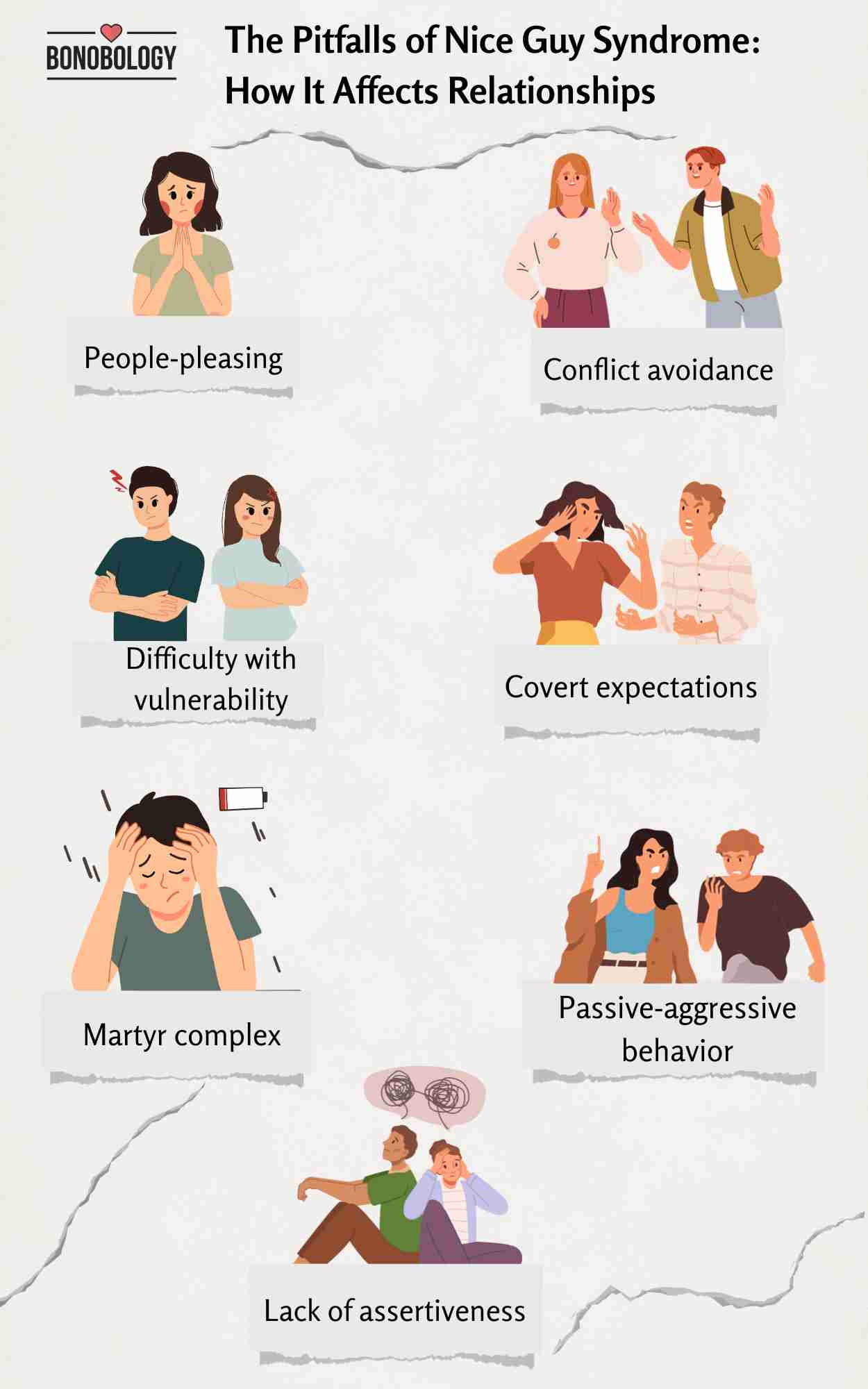
What Are The Signs Of Nice Guy Syndrome?
Recognizing real-life Nice Guy Syndrome examples is like uncovering a hidden map to a healthier, more fulfilling life in relationships. Whether you’re evaluating your own behavior or that of a partner, being aware of the things nice guys do can make a world of difference. Why? Because NGS can be a silent relationship killer, causing confusion, resentment, and unmet expectations. By understanding these signs, you take the first step to empower yourself. You can break free from the cycle and foster genuine, balanced connections.
Related Reading: How To Find The One: 13 Tried and Tested Tips
1. Excessive people-pleasing is a common habit among Nice Guys
Nice Guys have a tendency to go above and beyond to please others, often to the detriment of their own needs and desires. They might say yes to favors, commitments, or even relationship compromises, even when it’s not what they truly want. Among the things nice guys do, this is the most common sign.
This behavior stems from a fear of rejection or disapproval, as they believe that saying no might jeopardize their likability. Consequently, their true selves can get lost in the process, leading to a lack of authenticity in their interactions and relationships.
Example: The Nice Guy will always agree to dinner at their partner’s favorite restaurant, even if they dislike the cuisine. They’d even pretend to love the food and ambiance.
2. They avoid conflicts as much as they can
Conflict is a natural part of any relationship, but these good guys often go out of their way to avoid conflicts. And if they find themselves in one, they won’t stop apologizing. They fear that addressing issues might disrupt the peace or lead to rejection, so they choose to keep their concerns to themselves. They basically resort to avoidance as their conflict resolution strategy.
Example: I was watching a movie with this girl I liked and the movie was her suggestion. I found it so boring that I dozed off. When she finally woke me up and I realized what had transpired, I apologized like I had committed a crime.
This conflict avoidance can lead to:
- Unresolved tensions
- Unspoken grievances
- Emotional distance between them and their partners
3. Expecting something in return is one of the things nice guys do
Many of us have been raised with the belief that being kind, considerate, and accommodating should be the surefire path to love and happiness. However, in my experience with the Nice Guy Paradox, it’s a far more complex reality.
One of the defining features of NGS is the presence of covert expectations. Nice Guys often perform acts of kindness with the unspoken belief that their generosity will be reciprocated with love, attention, or favors. When these expectations aren’t met, they may feel resentful or unappreciated, not realizing that their needs were not transparent from the outset. On the other hand, there are men who ‘think’ they are nice and expect sexual intimacy from a date or partner because “I’m a nice guy.”
Example: This one encounter with this girl I liked changed my perspective. While I was complaining about her not acknowledging my value and efforts, she simply asked me this, “Do you do all these nice things for me so I reciprocate your feelings, or do you genuinely care for me?” Well, I urge you to ask yourself the same question.

4. They have difficulty expressing true feelings
Nice Guys frequently find it challenging to express their genuine thoughts and emotions, especially when those feelings might be perceived as less than agreeable. They fear that revealing their true selves or stating their needs may jeopardize their relationships or make them appear less ‘nice.’ Even when they do talk about their expectations or feelings, they avoid the whole truth.
Example: A man, in the middle of a deadline, might take the support of half-truths when a woman he likes calls him. He might say: “No, no, I am not busy at all.” “I’m listening, I’m not distracted.” This lack of open communication prevents them from forming honest connections.
Related Reading: 15 Ways To Solve Relationship Problems Without Breaking Up
5. Nice guys have a martyr complex
Some Nice Guys tend to cast themselves in the role of the perpetual victim or martyr. They willingly sacrifice their own happiness or well-being for the sake of others, often without being asked. While their intentions may seem noble, this behavior can result in feelings of frustration, unfulfillment, and the perception that their efforts are not adequately recognized or reciprocated.
Example: You invite a man to a party, but unfortunately the party gets canceled. He gets mad at you saying he had cancelled other plans for you. What would you say? Something along the lines of “I didn’t know you did, and I never asked you to,” right?
6. Nice Guys often display passive-aggressive behavior
Instead of addressing their grievances directly, Nice Guys may resort to subtle acts of passive aggression. They might employ sarcasm, give backhanded compliments, or engage in indirect communication to express their frustrations. This indirect approach to conflict resolution can be confusing and damaging to relationships, regardless of who does it – the guy or the girl in the relationship.
Example: About a year ago, my friend was upset with his colleague. One morning, her car broke down and she texted him (my friend) that she’ll be late. The next thing she knew, he had driven all the way across town to pick her up. How romantic, right? The drive to work, though, was quite unromantic as he didn’t say a word just to show her that he’s upset.
7. Lack of assertiveness is a sign of Nice Guy Syndrome
Nice Guys often struggle with assertiveness when it comes to expressing their needs, desires, or boundaries. They may avoid stating their preferences to avoid confrontation or upsetting their partners. This lack of assertiveness can result in unmet expectations and unfulfilling relationships, as their needs often go unaddressed. It’s hard for their partners or dates to take them seriously when they seem to go along with everything.
Think about it, if you don’t have preferences about where to hang out and you’d go anywhere your friends go, will they value your opinion? You’ll have to have an opinion for it to be valued, right?
How The Nice Guy Syndrome Affects Your Relationships
Now that we’ve explored Nice Guy Syndrome examples, it’s time to uncover the profound ways in which this behavioral pattern can shape, and often misshape, your romantic relationships. It’s the key to unlocking more fulfilling, authentic, and balanced partnerships.
- Unfulfilled expectations lead to feelings of frustration and disappointment
- Lack of honest communication and expression prevents partners from truly knowing each other
- Niceness could be seen by the man’s partner as manipulation when it becomes clear the man was being nice in order to get something out of them
- A fear of conflict results in unresolved issues, leading to emotional distance and resentment between partners
- Such behavior pattern creates imbalances in relationships, with one partner consistently sacrificing their own happiness for the other’s, leading to feelings of frustration and inequality
- Difficulty in assertively expressing needs or boundaries results in poor communication, causing misunderstandings and misaligned expectations
- NGS often inhibits the development of emotional intimacy, as partners may not feel comfortable or safe expressing their vulnerabilities and needs
Related Reading: 8 Signs You Have A Controlling And Manipulative Husband
How To Overcome The Nice Guy Syndrome?
Overcoming the Nice Guy Syndrome (NGS) requires you to break free from a cycle that holds you back in your relationships. Finding healthy ways to do it is important because it can help you build more real and happier connections. In this section, we’ll look at why it’s vital to break this pattern and learn some practical steps to do it. By taking this journey to better understand yourself and grow as a person, you can change how you approach relationships, making them more honest and respectful.
- Know yourself: The first step is to recognize and accept if you have NGS traits. Understand why you behave this way
- Set rules: Learn to say what you’re comfortable with and what you’re not. It’s okay to put your needs first
- Speak honestly: Practice clear and open communication. Share your feelings without fear
- Be real: Being open about who you are is a strength. Don’t be afraid to be yourself
- Take care of yourself: Remember that your happiness is important. Take care of yourself. Prioritize your own happiness and do things you genuinely enjoy more often
- Get support: It helps to talk to friends, family, or a licensed therapist who can guide and encourage you
- Change views: Challenge what society tells you about relationships and what it means to be a man
When you embark on this journey of overcoming the Nice Guy Syndrome, bear in mind that you’re not Steve Rogers and there is no potion that can transform you overnight into the first avenger. Reprogramming your childhood conditioning will take a lot of time, energy, self-reflection, self-awareness, and support. So be patient but keep moving.
Key Pointers
- Nice Guy Syndrome involves a guy’s covert expectations and a fear of rejection, leading to unmet romantic expectations
- Difficulty in expressing true feelings and conflict avoidance hinder genuine communication
- NGS can create an imbalance where one partner becomes a martyr, sacrificing their happiness
- Breaking free from NGS requires self-awareness, setting boundaries, and embracing vulnerability
- Seek support from friends, family, or a therapist in your journey to overcome NGS
- Challenge societal expectations about relationships and masculinity to foster authentic connections
Let’s look at it this way. In an ideal world, women simply wouldn’t date jerks over a nice guy, right? But attraction is based on a lot of other factors like the woman’s definition of a nice guy and a jerk, physical attractiveness, her preferences for a guy, etc. So, all you can do is work toward becoming your best self and putting that out in the dating world.
In the end, authenticity, open communication, and a healthy sense of self-worth are the keys to meaningful, balanced, and fulfilling relationships. So, embrace your true self, set boundaries, communicate openly, and offer without expectations. Remember that your happiness matters.
8 Open Relationship Rules That Have To Be Followed To Make It Work
Fluid Relationship Is A New Thing And This Couple Is Breaking The Internet With It
Your contribution does not constitute a charitable donation. It will allow Bonobology to continue bringing you new and up-to-date information in our pursuit of helping anyone in the world to learn how to do anything.





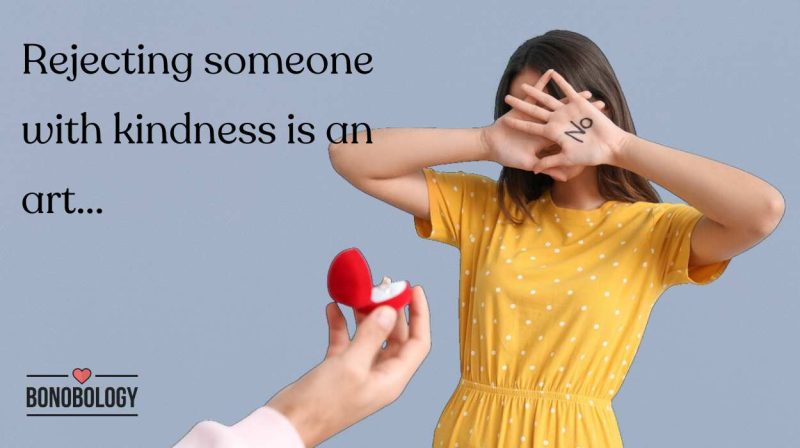
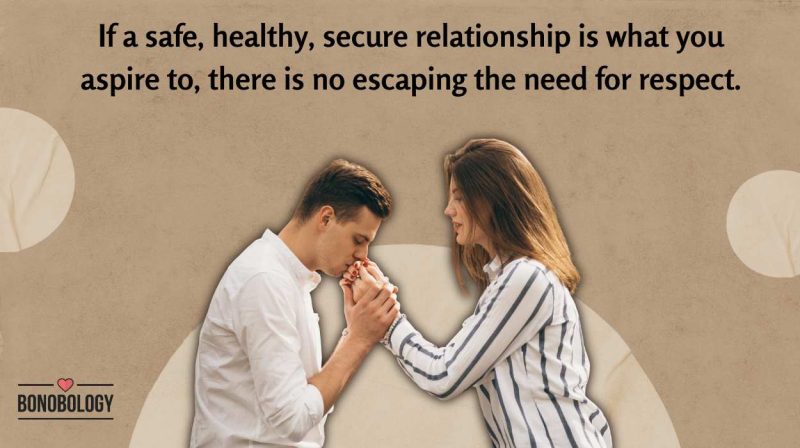
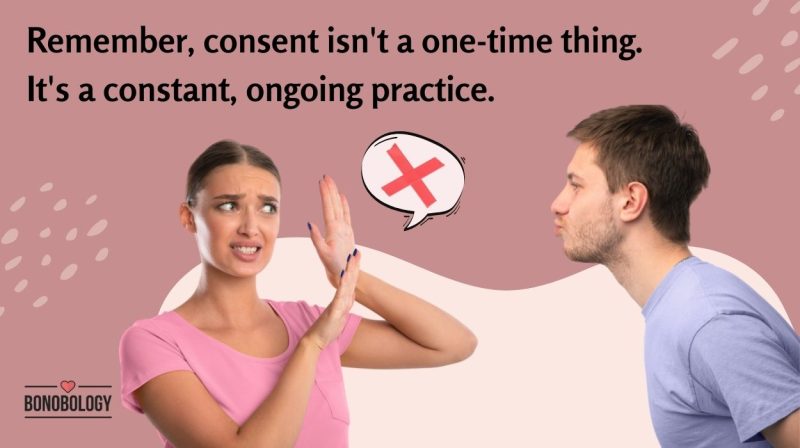

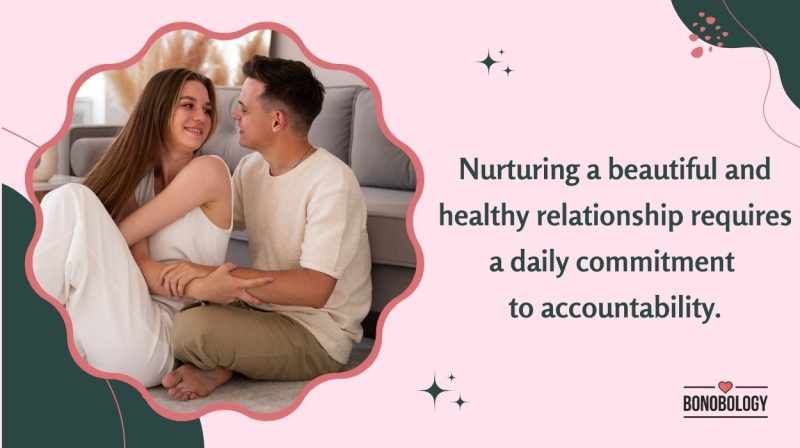
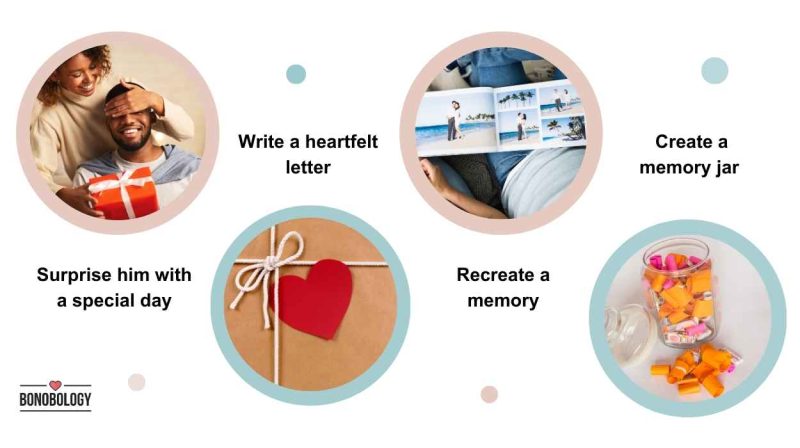
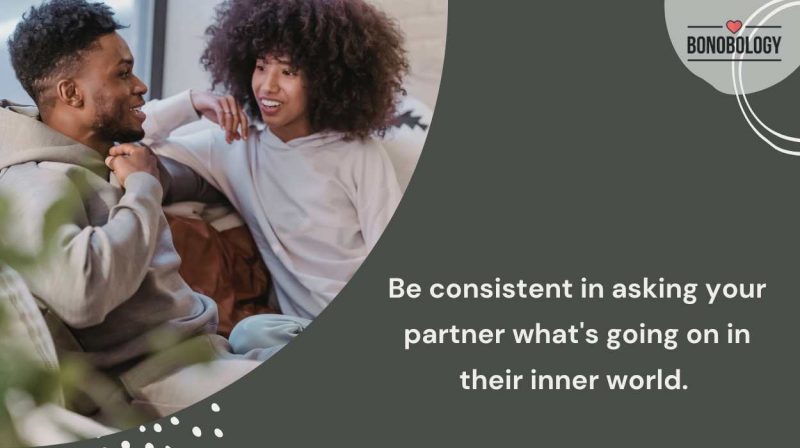




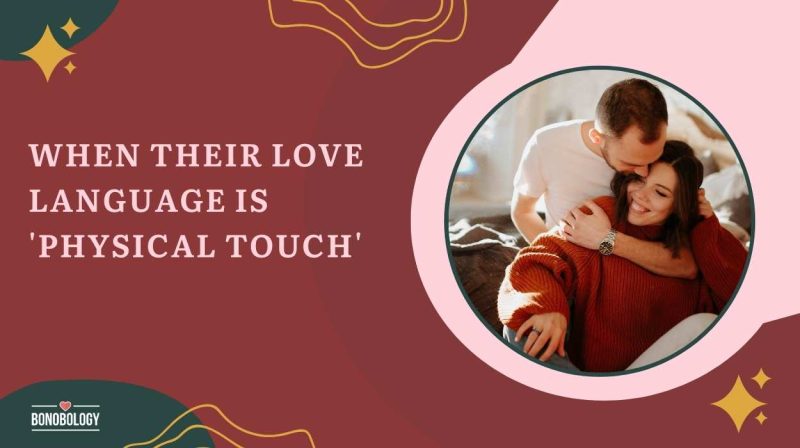
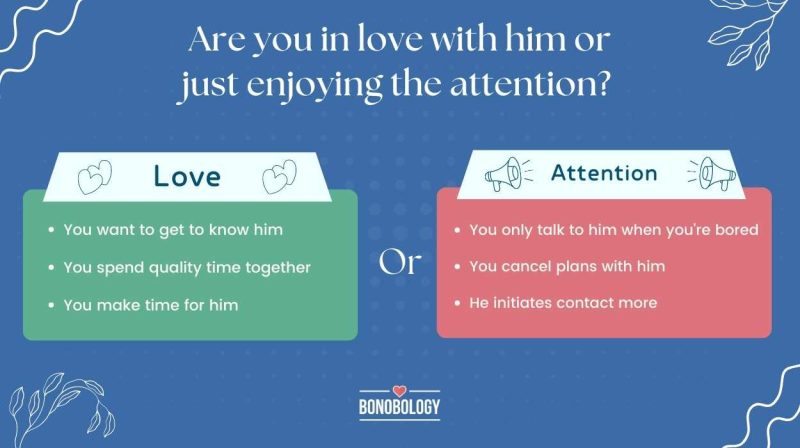
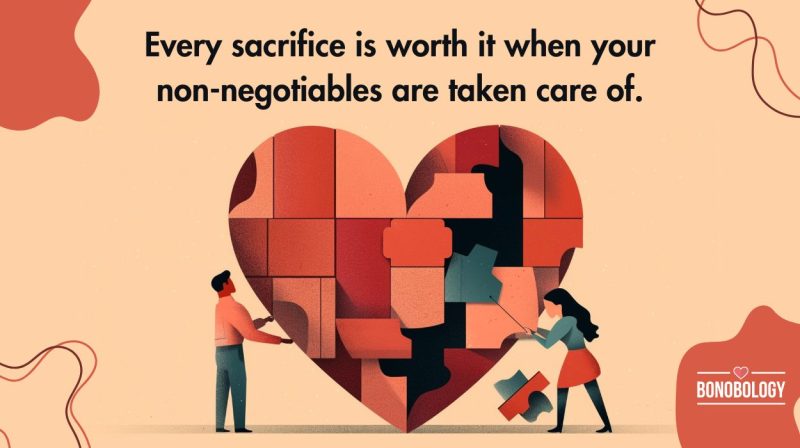
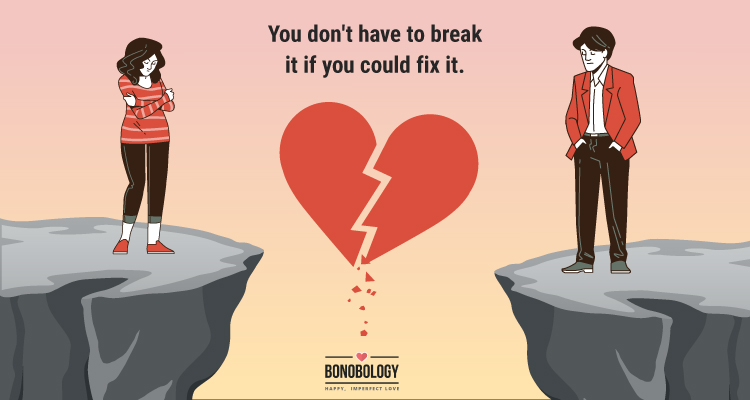
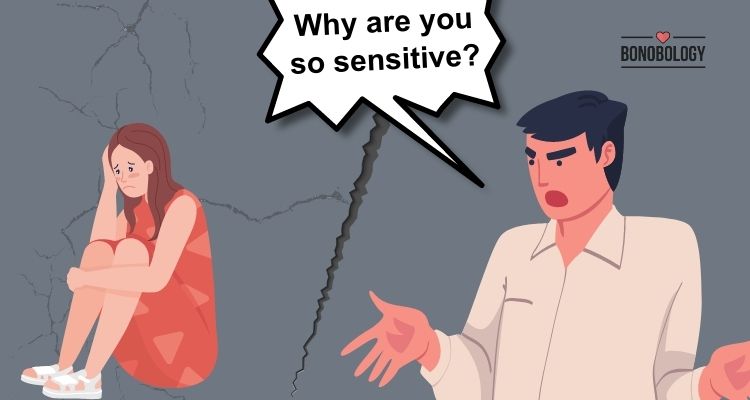

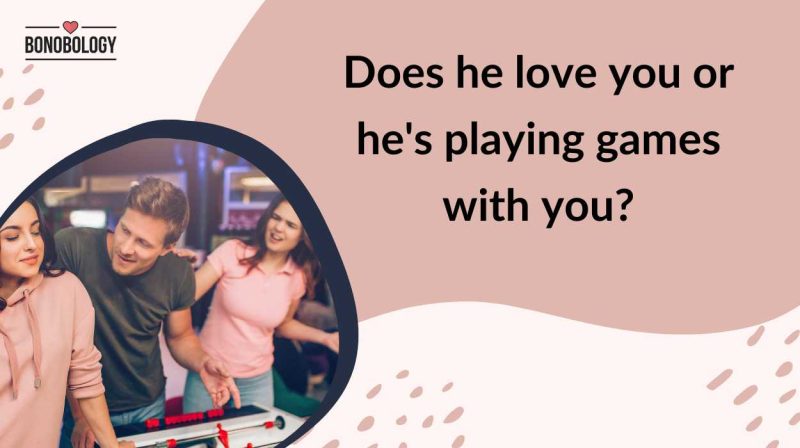
Featured
6 Tips for Helping Your Partner Quit Smoking in Their 50s
How He Treats You Is How He Feels About You — Is It True?
How To Let Someone Down Easy With Kindness And Grace — 13 Tips
How To Show Respect In A Relationship — 9 Ways
Navigating The Complexities Of Consent In Modern Relationships
11 Ways To Deal With A Sexually Demanding Husband
Accountability In Relationships – Meaning, Importance, And Ways To Practice
How To Apologize To Your Boyfriend: 15 Ways
10 Thought-Provoking Relationship Check-In Questions for Deeper Connection
Is A Monogamous Relationship Right For You? 11 Questions To Help You Find Out
10 Signs You Are In A Truly Stable Relationship (Even If You Feel Otherwise)
7 Subtle Signs Your Partner is Quiet Quitting Your Relationship
Secure Relationships – What Are They And What Do They Look Like?
Physical Touch Love Language: What It Means With Examples
Do I Like Him Or The Attention? Ways To Find Out The Truth
17 Non-Negotiables In Relationships You Must Never Compromise On
15 Ways To Solve Relationship Problems Without Breaking Up
9 Common Narcissist Gaslighting Examples We Hope You Never Hear
The Most Important 7 Qualities Of A Healthy Relationship
15 Early Signs He Is A Player And Isn’t Serious About You